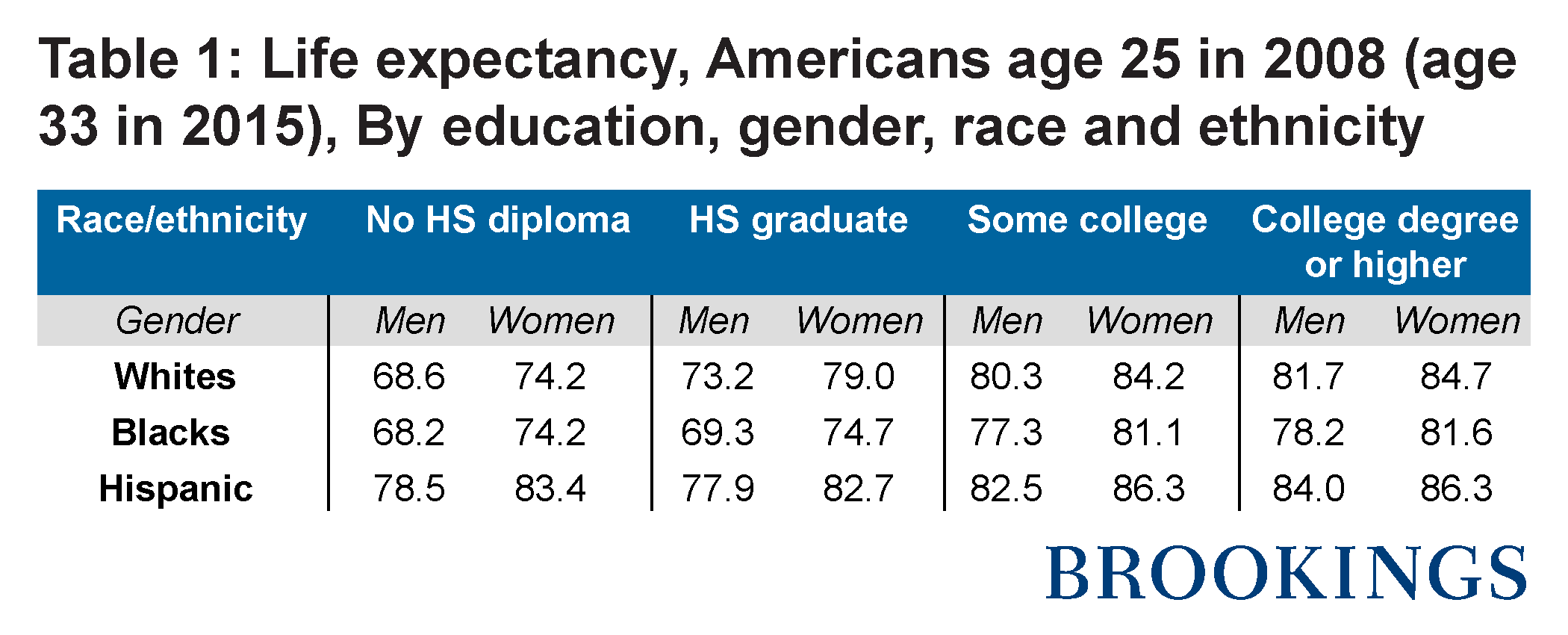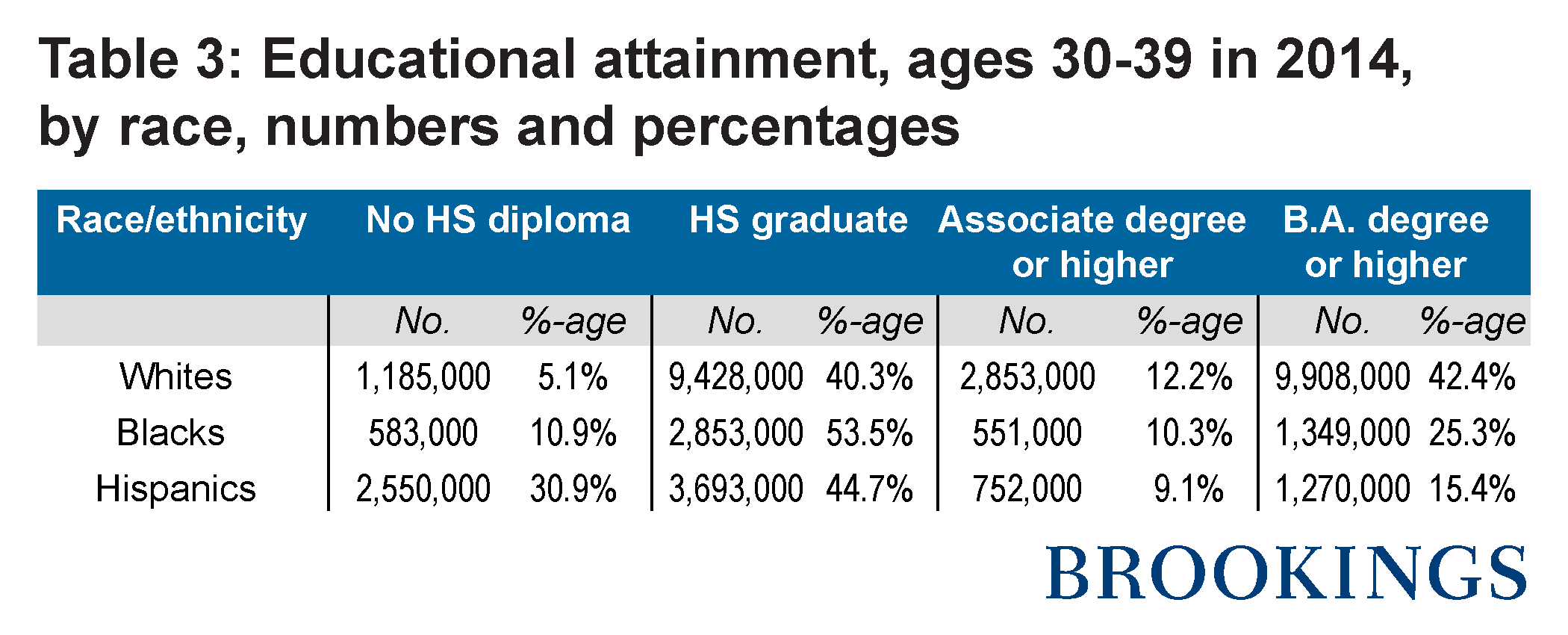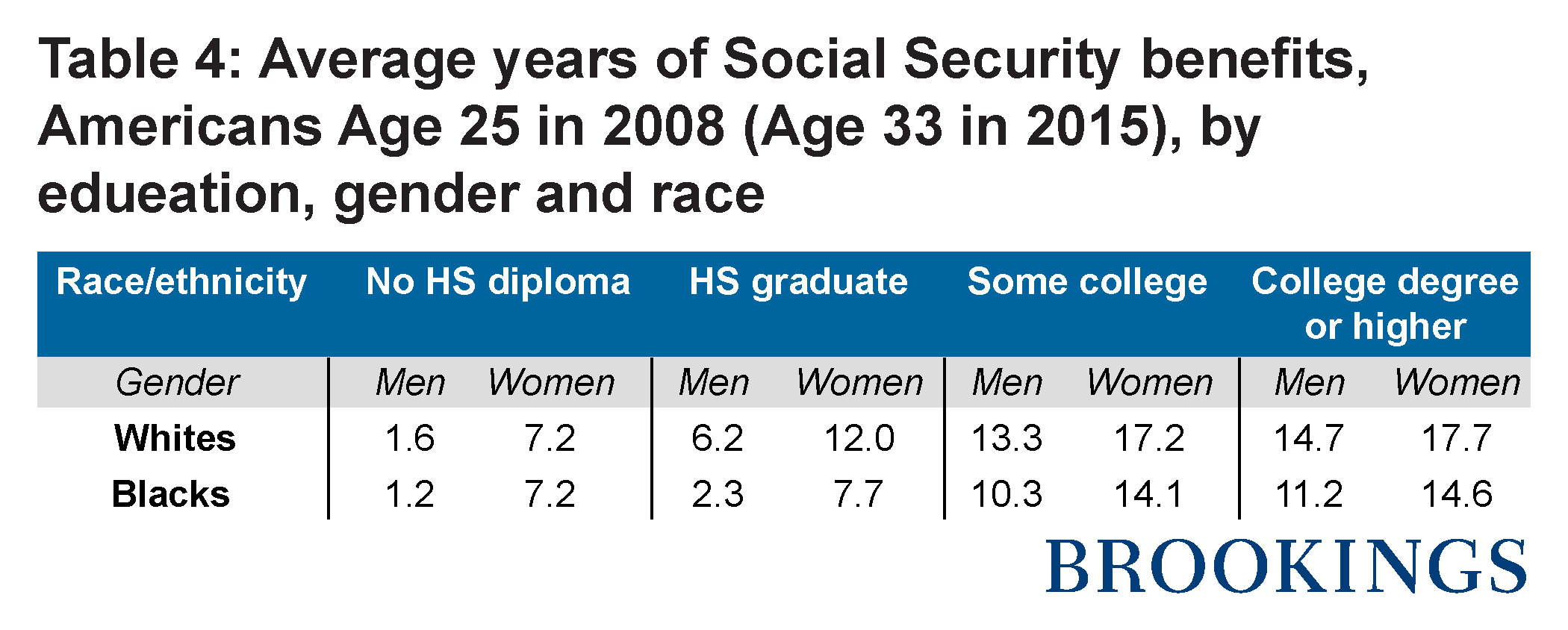In last Thursday’s GOP debate, Marco Rubio, Ted Cruz, Jeb Bush and Chris Christie managed to avoid mentioning their common proposal to “reform entitlements” by raising the Social Security retirement age from 67 to 70. That was probably a good idea. Their proposal only demonstrates their lack of understanding about the demographics of older Americans, especially the dramatic disparities in their life expectancy associated with education and race. Recent research on life expectancy indicates that their proposed change would effectively nullify Social Security for millions of Americans and sharply limit benefits for many millions more.. While many people in their 30s and 40s today can look forward to living into their 80s, the average life expectancy for the majority of Americans who do not hold a college degree hovers closer to 70, or the average life expectancy for all Americans in 1950.
The Widening Inequalities in the Life Spans of Americans
This research, summarized recently in a study published in Health Affairs, found that life expectancy for various age cohorts of Americans is closely associated with both educational achievement and race. For example, the average life expectancy for college-educated American men who were age 25 in 2008, or age 33 today, is 81.7 years for whites and 78.2 years for blacks. (Table 1, below) By contrast, the projected, average life span of high-school educated males, also age 25 in 2008 or 33 today, is 73.2 years for whites and 69.3 years for blacks. Women on average live longer than men; but similar disparities based on education and race are evident. The average life expectancy of women age 25 in 2008, or 33 years old today, was 79 years for whites and 75.4 years for blacks for those with a high school diploma, and 84.7 years for whites and 81.6 years for blacks with college degrees. Most disturbing, the average life expectancy of Americans age 25 in 2008 without a high school diploma is just 68.6 years for white men, 68.2 years for black men, 74.2 years for white women, and 74.9 years for black women. Surprisingly, the researchers found that Hispanics in this age group have the longest life expectancies, even though they also have the lowest average levels of education. Since these data are anomalous and may reflect sampling problems, we will focus mainly on the life-expectancy gaps between African American and white Americans.

Tallying How Many People Are Adversely Affected
Census data on the distribution by education of people age 25 to 34 in 2010 (ages 30 to 39 in 2015) provide a good estimate of how many Americans are adversely affected by these growing differences. Overall, 56.3 percent of all Americans currently in their 30s fall are high school graduates or left school without a high school diploma, educational groups with much lower average life expectancies. (Table 2, below) More precisely, 10.1 percent or almost 4.8 million Americans in their 30s today lack a high school diploma, and 46.2 percent or 18.9 million thirty-somethings have high school diplomas and no further degrees. All told, they account for 23,702,000 Americans in their 30s; and among older Americans, the numbers and percentages are even higher.

Since race as well as education are major factors associated with differences in life expectancy, we turn next to education by race (Table 3, below). The totals differ modestly from Table 2, because Census data on education by race cover ages 30-39 in 2014, while Table 2 covers age 30-39 in 2015 (ages 25-34 in 2010).

- Among people in their 30s today, 45.4 percent of whites or 10,613,000 Americans have a high school degree or less – and their average life expectancy is 9.4 years less than whites in their 30s with a college or associate degree.
- Among people in their 30s todays, 64.4 percent of blacks or 3,436,000 Americans have a high school degree or less – and their life expectancy is 8.6 years less than blacks in their 30s with an B.A. or associate degree, and 11.6 years less than whites with a college or associate degree..
- Among people in their 30s today, 75.6 percent of Hispanics or 6,243,000 Americans have a high school degree or less – and their life expectancy is 5.0 years less than Hispanics in their 30s with a college or associate degree.
As a policy matter, these data tell us that across all communities—white, black, Hispanic—improvements in secondary education to prepare everyone for higher education, and lower-cost access to higher education, can add years to the lives of millions of Americans.
Preserving Meaningful Access to Social Security Benefits
The widening inequalities in average life expectancy associated with race and education have more direct policy implications for Social Security, because the number of years that people can claim its benefits depends on their life spans. The growing inequalities in life expectancy translate directly into growing disparities in the years people can claim Social Security benefits, based on their education and race. Assuming that Americans in their 30s today retire at age 67 (the age for full benefits for this age group), they can expect to claim retirement benefits, on average, ranging from 1.2 years to 19.3 years, based on their education and race. (Table 4, below)

The most pressing issues of life expectancy and Social Security involve white males, black males, and black females without college degrees: Among Americans age 33 today, white and black men without high school diplomas and black males with high school degrees, on average, can expect to live long enough to collect benefits for less than three years. Similarly, white and black women without high school diplomas and black women with high school degrees, on average, can expect to collect benefits for less than eight years. Together, they account for 25.2 percent of whites and 64.4 percent of blacks in their 30s today. By contrast, male and female white college graduates age 33 today, on average, can expect to collect Social Security for between 14.7 and 17.7 years, respectively; and 33-year old black men and women with college degrees, on average, will claim benefits for 11.2 to 14.6 years, respectively.
These findings dictate that proposals to raise the Social Security retirement age should be rejected as a matter of basic fairness. Among this year’s presidential hopefuls, as noted earlier, Ted Cruz, Marco Rubio, Jeb Bush and Chris Christie all have called for raising the retirement age to 70 years. Under this policy, black men in their 30s today without a college degree and white men now in their 30s without a high school diploma, on average, would not live long enough to collect any Social Security. The change would reduce the average number of years of Social Security for Americans in their 30s today,
- From 1.6 years to -1.4 years for white men with no high school diploma,
- From 1.2 years to -1.8 years for black men with no high school diploma, and
- From 2.3 years to – 0.7 years for black, male high-school graduates.
Furthermore, among Americans in their 30s today, white and black women without a high school diploma, white male high school graduates, and black female high school graduates, would live long enough, on average, to collect Social Security for just 3.2 to 5.4 years. The GOP change reduce the average number of years of Social Security for Americans in their 30s today,
- From 6.2 years to 3.2 years for white, male high school graduates,
- From 7.2 years to 4.2 years for white women with no high school diploma,
- From 7.9 years to 4.9 years for black women with no high school diploma, and
- From 8.4 years to 5.4 years for black, female high-school graduates.
All told, proposals to raise the retirement age to 70 years old would mean, based on the average life expectancy of Americans in their 30s today, that 25.2 percent of whites in their 30s and 64.4 percent of blacks of comparable age, after working for 35 years or more, would receive Social Security benefits for 5.4 years or less.
The Brookings Institution is committed to quality, independence, and impact.
We are supported by a diverse array of funders. In line with our values and policies, each Brookings publication represents the sole views of its author(s).




Commentary
Life expectancy and the Republican candidates’ Social Security proposals
January 29, 2016